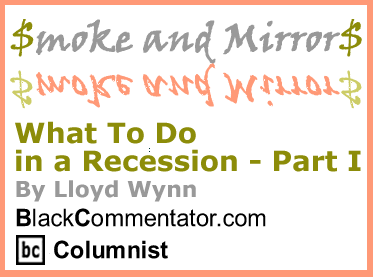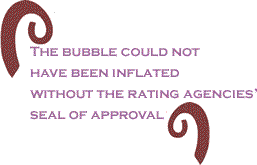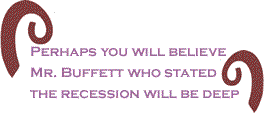
|
||||||||||||||||||||||
 |
||||||||||||||||||||||
 |
||||||||||||||||||||||
 |
||||||||||||||||||||||
 |
||||||||||||||||||||||
 |
||||||||||||||||||||||
 |
| The current issue is always free to everyone |
|
|
 |
“The banks exposed themselves too much; they
took on too much risk .... It's their fault. There's no need
to blame anyone else.” Warren Buffett in an interview with a
“I believe that we are already in a recession…It
will be deeper and longer than what many think.” Warren Buffett
quoted by a German newspaper May 25, 2008, when asked whether
the If you are reading this article, I probably do not need to give you the bonafides of Warren Buffett, other than to say he is one of the wealthiest men in the world and most of his wealth is derived from investments made over 50-plus years. Unlike many men of his stature, Mr. Buffett exudes folksy Midwestern charm and has an impeccable reputation for being ethical and remarkably honest. But I respectfully disagree with his conclusion as to the responsibility for the sub-prime crisis.
In the summer of 2007, after the collapse of two of Bear Stearns hedge funds and a wave of defaults on sub-prime loans within mortgage-backed securities and collateralized debt obligations, rating agencies came under scrutiny by investors and some states - over the investment grade ratings on what essentially turned out to be junk. The rating agencies’ response, particularly Moody’s, was to refer their complainants to the companies’ disclaimers: S&P - “Any user of the information contained herein should not rely on any credit rating or other opinion contained herein in making any investment decision.” Moody’s - “Moody's has no obligation to perform, and does not perform, due diligence.” When critics of the agencies discovered the issuers-investment
houses-were paying the rating agencies fees for their ratings
and consultancy, an avalanche of lawsuits followed. Attorneys
general, institutional investors and astute observers did not
agree with Mr. Buffett. The bubble could not have been inflated
without the rating agencies’ seal of approval.
Because this is not a cyclical phase in the economy,
consumers will need to make some adjustments in their personal
lives. BlackCommentator.com Columnist, Lloyd Wynn was a consultant in the secondary market. Lloyd is the author of Residential Real Estate Finance: From Application Through Settlement. Click here to contact Lloyd Wynn. |
Your comments are always welcome. e-Mail
re-print notice
If you send us an e-Mail message we may publish all or part of it, unless you tell us it is not for publication. You may also request that we withhold your name. Thank you very much for your readership. |
|
| May
29, 2008 Issue 279 |
|
| Executive Editor: Bill Fletcher, Jr. |
| Managing
Editor: |
| Publisher: Peter Gamble |
| Est. April 5, 2002 |
| Printer Friendly Version in resizeable plain text format or pdf format. |
 |
 |
 |
| |
| |























 Mr.
Buffett is chairman and chief executive officer of Berkshire
Hathaway.
Mr.
Buffett is chairman and chief executive officer of Berkshire
Hathaway.  A
structural shift is occurring within our economy due to several
trends in the markets over the past two decades and a half.
Now the entire
A
structural shift is occurring within our economy due to several
trends in the markets over the past two decades and a half.
Now the entire 







